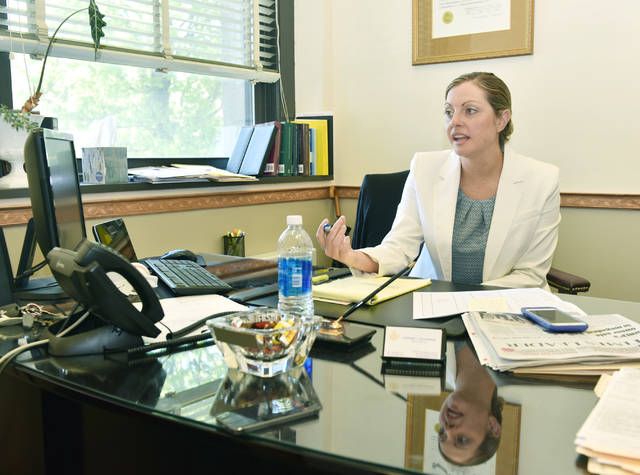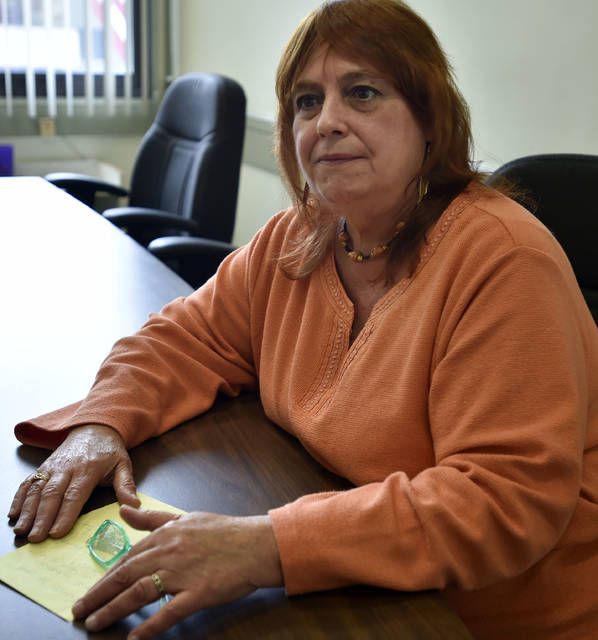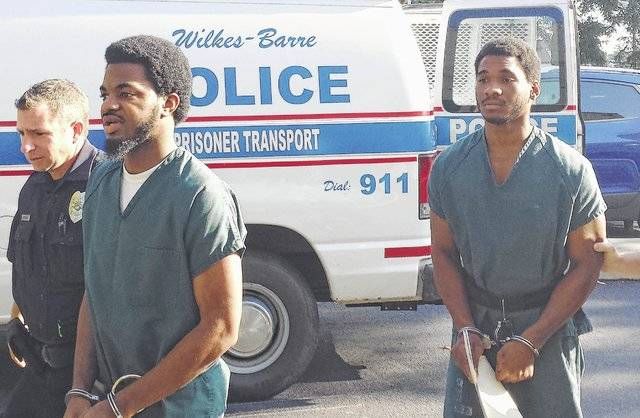Click here to subscribe today or Login.
WILKES-BARRE — When two young girls were injured after being caught in the crossfire of a shooting at the Sherman Hills apartment complex in August 2013, witnesses were at the scene, but none cooperated with investigators, according to Luzerne County District Attorney Stefanie Salavantis.
When a witness came forward almost a year later, arrests were made.
Salavantis and other officials stress that while law enforcement agencies work constantly to fight crime, citizens have a responsibility to cooperate with investigators when they see one being committed.
Those calls for action apparently are being heard, because officials say more and more citizens are coming forward to do their part because they realize law enforcement can’t solve crimes alone.
“I think stressing that is what’s important,” Salavantis said, adding that her office does not track the number of witnesses who provide information.
Joseph Coffay, commander of investigations for the Wilkes-Barre City Police Department, said witnesses are crucial from the start.
“One of the first things in an investigation is to secure the scene, and then identify witnesses, and then try to corroborate what the witnesses have to say,” he said.
Coffay added that witnesses usually are taken to police headquarters to be interviewed by detectives as soon as possible to get an accurate account of what happened.
Michael Dessoye, chief of detectives for the Luzerne County District Attorney’s Office, said witnesses often are interviewed separately so investigators can compare and corroborate their statements.
Dessoye compared multiple witnesses’ statements to building a chain — “link after link after link, until the chain is completed.”
Coffay said “anything and everything” relating to an incident is important to investigators, even if witnesses might think the information is irrelevant.
Michael Krzywicki, chief of the Kingston Municipal Police Department, put the importance of cooperating witnesses into perspective, estimating that approximately 15,000 residents, or “30,000 eyes,” see what’s going on in the borough.
He has 19 officers patrolling the streets.
“Without their (citizens’) cooperation, it makes our job even more difficult,” Krzywicki said.
‘Scared for their lives’
Salavantis said the fear of retaliation probably is what kept witnesses from coming forward when the two girls were shot at Sherman Hills.
On Aug. 24, 2013, Jamal Alford and Trevor Forest Whitaker allegedly opened fire into a residence at the complex. Investigators said they were gunning for William “Junie” Cash, but instead struck 5-year-old Janiya McFarlane and 2-year-old Gabrielle Morris.
McFarlane survived a gunshot wound to her neck, and Morris survived a gunshot wound to her face.
Police charged Alford, known by the street name “Flea,” and Whitaker in June 2014 in connection with the shooting.
Alford admitted to two counts of aggravated assault in June 2015 and was sentenced to three to six years in state prison. Whittaker pleaded guilty in June 2015 to aggravated assault and possession of a prohibited firearm and was sentenced to up to eight years in state prison.
Coffay said the public often is willing to come forward for lesser crimes, but not when they are gang-related or violent in nature.
“That’s where you have a difficult time not only identifying witnesses, but getting people to come forward,” he said.
Salavantis said fear had everything to do with why so many witnesses kept quiet about the 2013 shooting at Sherman Hills.
“A guy could come in and just shoot in an apartment complex at two little girls; they (witnesses) were scared for their lives,” she said.
When it comes to gang-related crimes, Salavantis said witnesses themselves can be involved in criminal activity or might fear retaliation.
“They’re friends with each other, they can easily identify each other, they hang out with each other,” she said. “So that’s why they get nervous about providing information.”
When it comes to the general public assisting authorities, Salavantis said retaliation is “very, very rare.”
Salavantis, Coffay and Dessoye said they could not recall an instance in which a member of the public was retaliated against for providing information.
Krzywicki said most residents of his borough are more than willing to aid in an investigation. Victims of domestic abuse, he said, are less willing due to the fear of retaliation.
Salavantis said it’s disappointing when witnesses don’t cooperate.
“It is frustrating because you have the community out there nervous … and we’re out there trying to find any bit of information, any bit of evidence that can connect the person we believe committed the crime to this crime and filing charges,” she said.
Coffay added that when imploring witnesses to testify, as with the shooting involving the two young girls, investigators will appeal to their heartstrings.
“You try to actually talk to them and appeal to their humanity,” he said. “Unfortunately, sometimes it doesn’t work.”
Aiding witnesses
Officials have numerous tools to help witnesses feel safe if they decide to provide information.
The Wilkes-Barre Crime Watch Coalition not only encourages witnesses to report what they see, but how to do it in a safe manner. The coalition consists of 14 crime watches — seven in the city’s high rises, and seven in various neighborhoods.
Charlotte Raup, president of the coalition for the past 30 years, said a string of burglaries in her neighborhood led to her creating the crime watch in the Parsons section of Wilkes-Barre before she became president of the coalition.
“We teach people to be good witnesses,” said Raup, 60. “When you see something happening, your mind doesn’t know how to wrap around it.”
Raup explained that one of her organization’s goals, along with reporting crime, is to teach members how to be good witnesses.
With cellphones readily available, Raup said most members will take notes of vital information if a crime happens, such as a license plate number, suspect description, or what a suspect was last seen wearing.
Raup learned the hard way just how important those details are.
She recalled being in court testifying against someone she saw steal a car. The suspect’s attorney, she said, was focused on the fact that Raup could not remember what pants the suspect was wearing.
Some witnesses also get intimidated when faced with the fact that they will have to cooperate during court proceedings, Coffay said.
Salavantis said witness names generally are left out of criminal complaints, but witness testimony is crucial for prosecutors to secure convictions.
Crime-watch members have a system in place called Court Support. If a member has to testify in court, Raup said members will accompany that person in clothing identifying the members as crime-watch participants in order to provide a sense of solidarity.
The county’s grand jury also could ease witnesses’ fears about testifying. The grand jury relies on a pool of about two dozen members, plus alternates, to help prosecutors gauge if charges can be filed.
Salavantis said the secrecy of the grand jury could be appealing for witnesses. Everyone involved, from attorneys to stenographers, must remain silent about the grand jury’s activities or face prosecution.
“Just that tool (is important) in providing a type of confidentiality where people feel that they’re safe going there, going in front of the grand jury, and that no one else will know about it,” she said. “It’s an amazing tool for law enforcement.”
The grand jury also could keep witness testimony truthful, because Salavantis said perjury charges committed before a grand jury tend to be more strict than in front of a regular jury.
“You subpoena them to be in front of a grand jury; that is more intimidating for them, and they then think twice about lying,” Salavantis said.
In cases where witnesses feel their lives are in danger, witness protection could be utilized.
Dessoye explained that if a witness feels his or her life is in danger or if threats have been made, officials may utilize the attorney general’s witness protection program to relocate the witnesses if investigators find the threats are credible.
Through that program, the witness is relocated, given expense money, and is prohibited from contacting family or anyone in their community. Salavantis said witnesses are not given new identities.
Dessoye declined to provide further specifics, but said that in the past 10 years, the program has been used only about half a dozen times in Wilkes-Barre.
Tipline
When witnesses come forward in a case, the action often leads to arrests.
Krzywicki estimated that 75 percent of his department’s calls in Kingston come from tips or complaints from residents.
The Wilkes-Barre Crime Watch Coalition has a tipline, which Coffay said has been fruitful in investigating crime. That number is 570-208-8900.
“A lot of times with the information that we gather, we have to go out and corroborate it either with surveillance or other investigative techniques,” he said.
Coffay added that some calls have identified witnesses who might have seen crime happening, or areas where citizens believe drugs may be sold.
Like Salavantis, Raup said she has noticed more people participating with the crime watch to ensure that crimes are reported.
“They want their city the way it was before, ” she said.
For other local news stories, click here.








